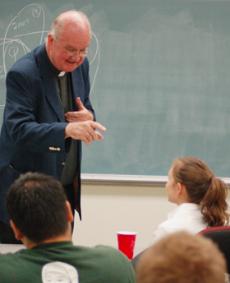Loyola professors the Rev. David Boileau, S.J., and Walter Block on Tuesday afternoon brought to life the university’s ideals of thinking critically while debating acting justly in terms of economic and political policies.
At the economics club meeting both Block and Boileau agreed that everyone is generous at heart and that no one really wants people to starve. They had very different ideas, however, about employee and employer relationships, as well as how to solve the problem of poverty.
Block, an economics professor, argued that “unions are just a criminal gang,” when on-strike workers interfere with the rights of potential workers either by physical violence or by getting laws passed that force their employers to retain existing workers.
“The only way we should deal with each other is on a voluntary basis,” said Block. He compared involuntary interaction at its worst with slavery, referring to the role of a boss who is forced to continually associate with his existing workers who cannot quit their jobs.
Boileau, who teaches philosophy, focused more on the ethical side than on economics. He said that Block’s point of view describes a man who is outside of his environment.
The positive outcome of unions is that they provide equity and safety to its employees, traits that don’t come cheap, Boileau said.
He also spoke at length about the concept of corporate responsibility. He said that while employees have a responsibility to their employer to produce goods as quickly and efficiently as possible, the employer has a responsibility to his workers to provide them with living wages.
Loyola wasn’t off limits as Boileau questioned the ethics of the university.
“We’re supposed to be a social justice institution. We had buses out here (earlier this year) taking kids to Wal-Mart. Those sandals you got on, buddy, were built by a Chinese girl for $1 an hour,” he said to a student attending the meeting.
Not having enough money to pay living wages was a problem for the unions to solve, said Boileau. “It’s an economics problem, it’s a political problem, it’s no longer a union problem.”
The long-debated question of who product capital belongs to came up several times during the debate, as well.
Boileau argued that the capital belongs not only to the employers, but also to the employees. If the employee is making the product, the employer has a moral responsibility to give that employee a living wage, Boileau said.
Block disagreed, saying that “any worker can get up on his hind legs and declare himself a boss,” by saving money and hiring an employee. The employers own the capital because they are the ones making investments and taking risks on products, Block said.
Employer responsibility was also addressed at the debate in addition to owner responsibilities. “The living wage comes from productivity, not from the generosity of the employer,” Block said.
Wages cannot go up, though, unless productivity goes up, Block said. One way to raise productivity is to have high quality capital equipment, which, according to Block, is achieved through the freedom of companies to obtain capital from whomever they can.
Alethia Picciola can be reached at ampiccio@loyno.edu.






